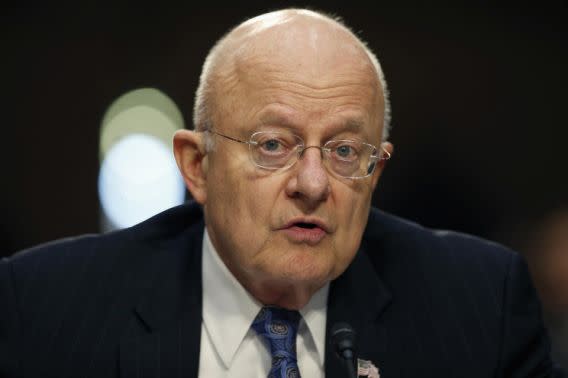Intelligence chief: Russia’s election interference went far beyond hacks
Director of National Intelligence James Clapper says the Russian government’s interference with the United States election went far beyond the now highly publicized hacks of Democratic email accounts, which were merely one part of a multilayered campaign of propaganda and deception.
The intelligence leader outlined various methods wielded by Moscow to interfere with U.S. institutions during Thursday morning testimony on cyberattacks before the Senate Armed Services Committee.
The testimony comes at a point of tension between the U.S. intelligence community and Donald Trump. The president-elect, set to meet with intelligence brass on Friday, has repeatedly cast doubt on the U.S. government’s conclusion that Russian state-sponsored cyberattacks sought to influence the election.
At the hearing, Sen. Martin Heinrich, D-N.M., asked Clapper if he could address not only classified information but also the relevance of publicly available information in seeing the full picture of Russia’s activities.
“While there has been a lot of focus on the hacking, this is actually part of a multifaceted campaign that the Russians mounted,” Clapper told the committee.
Clapper pointed to the Kremlin-funded TV channel RT, previously called Russia Today. “Of course RT, which is heavily supported, funded by the Russian government, was very, very active in promoting a particular point of view, disparaging our system,” he continued.

He said Russia would exploit any crack in the United States’ integrity — such as the nation’s alleged hypocrisy about human rights — through social media, fake news, propaganda and so on.
The totality of Russia’s effort, regardless of its ultimate impact, was a concern to Clapper as both an intelligence official and as a U.S. citizen, he said.
Earlier in the testimony, Clapper said the campaign against the U.S. also entailed the kind of “classical propaganda” that Russia has long used, especially when “promulgating disinformation.”
Marcel Lettre, the under secretary of defense for intelligence, said the U.S. needs to look at ways to “impose costs” against adversaries for such actions on a case-by-case basis as they arise. The U.S. can work to deter and respond to attacks through methods like President Obama’s recent sanctions, but they can be much broader as well, he said.
“From the military’s perspective, we’re concerned not only with Russia’s cyberhacking but also with a range of aggressive actions by Russia across multiple regions of the globe. So we look to impose costs on Russia by a range of measures across multiple regions in partnership with our allies, through NATO, where we can to push back Russian actions and deter future actions.”
Sen. John McCain, R-Ariz., did not appear too impressed with this “case-by-case” tactic. “It’s not a strategy,” he said.
Earlier, McCain suggested that if Russia had in fact succeeded in altering the outcome of an election that it would constitute an attack on the United States. He asked Clapper if he agreed with that assessment.
“Whether or not that constitutes an act of war I think is a very heavy policy call that I don’t believe the intelligence community should make,” Clapper replied, “but would carry in my view great gravity.”


